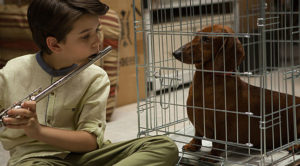Todd Solondz Has Gone To The (Weiner) Dogs

With films such as Welcome to the Dollhouse, Happiness, Storytelling, Palindromes, Life During Wartime and Dark Horse, director Todd Solondz has explored the dark side of suburban life. His latest effort, Wiener-Dog, takes on similar subject matter. Divided into a series of short vignettes, the movie follows the life of a dachshund as it goes from owner to owner. The cast features Julie Delpy, Greta Gerwig, Danny DeVito, Ellen Burstyn and Zosia Mamet. Solondz recently phoned us from New York to discuss the movie.
What inspired the concept for the film?
I wanted to do a dog movie. I thought about Au Hasard Balthazar and I watched that again. It has an oblique narrative that gave me a certain confidence to pursue this in the way I structured it. It’s yes and no a dog movie. It’s connected by the life trajectory of a dog that passes from owner to owner, but it’s more of a conceit. It’s how our mortality hovers over each of these protagonists and stories.
What was it like to work with a dog?
It was an ordeal. I hadn’t known until I was in production. I learned from the ASPCA that because of the way they breed the dog for the marketplace, they breed a certain amount of intelligence out of them. I worked with three or four of them and they were all remarkably stupid. It was very hard. These were show dogs and they still didn’t understand any commands. They didn’t respond to “stay” or “sit” or anything. For the interlude, we had to put it on a treadmill and we sat around for three hours until we could get 12 seconds of usable footage. That’s what it was like working with the dog. They’re cute but they’re mentally deficient. It’s a sad state of affairs.
I thought it was interesting that the first family we see in the movie started having problems because the dog brought their issues to the foreground.
It certainly dramatizes the idea that not only does the dog live in a cage but the little boy lives in a metaphorical cage.
Talk about the decision to shift the focus for the second half of the movie, which follows a frustrated screenwriter and college professor.
It goes from owner to owner. I didn’t feel the need to explain how it gets from one place to the other. The protagonists age from section to section to section. I suppose the first half is a little sunnier than the second half. The two halves are unified by the way in which the characters contend with the reality of their mortality.
How much do you identify with Danny DeVito’s character?
I feel for him, but no less and no more than any of the other protagonists. It’s a sad story about ambitions and dreams and a man’s quest for meaning and redemption. It’s suffused with a certain satire. That’s hard not to apply since I’m a teacher. While I love teaching and I love my students and I have wonderful colleagues, I do have an inside view of how NYU is a kind of evil empire managed with a remarkable level of incompetence and corruption. While it’s not about film school per se, it’s informed by that understanding.
I think it’s interesting that he’s criticized for being too negative and not for being a poor teacher.
That’s the irony. I think even as he is a failed screenwriter, he actually could be a good teacher. He has some sensible things to say but is viewed too much as a dinosaur to young people.
I found myself agreeing with him that a good screenplay needs to have some kind of “what if.” Is that a ridiculous notion?
I think it’s a reasonable approach to teaching. It’s so easily mocked but not in any way inherently formulaic.
I don’t want to spoil anything but can you talk about the film’s end and why you chose to bring things to a close in that manner?
I thought it would be nice to resurrect the dog there in the end. Art is a transformative experience. Everything is fraught with ambiguity and ambivalence. We look at pets and dogs as, in some sense, vessels for our own hopes and dreams and illusions. We project an innocence and purity on them. This is why it’s often harder for people to see harm befall a little dog than to befall a human.
What kind of reactions have you gotten from screenings?
I’m pleased so far. It’s hard for me to gauge these responses. I sat through two screenings, and they seemed to respond in similar ways. I’ve always described my movies as sad comedies but this one I might call a comedy of despair. That’s the way I feel. If there weren’t an emotional consequence to what takes place, I don’t think I would have put myself through the ordeal of making it.
Have you started thinking about your next project yet?
I will once I put together the money. I’ve had made more movies if it didn’t take so long to get the financing together. It’s nice to be optimistic if one has it within oneself. I’ve got a few projects, and I’m hoping one of them will see the light of day sooner or later. Until it happens, it doesn’t happen. We’ll see.










